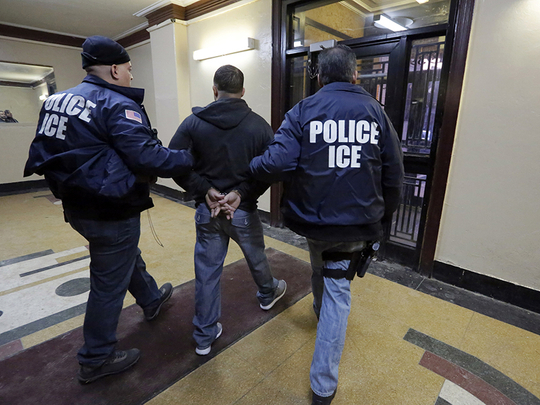
Washington: Tens of thousands of immigrants detained by US Immigration and Customs Enforcement were forced to work for $1 (Dh3.67) per day, or for nothing at all — a violation of federal anti-slavery laws — a lawsuit claims.
The lawsuit, filed in 2014 against one of the largest private prison companies in the country, reached class-action status this week after a federal judge’s ruling. That means the case could involve as many as 60,000 immigrants who have been detained.
It’s the first time a class-action lawsuit accusing a private US prison company of forced labour has been allowed to move forward.
“That’s obviously a big deal; it’s recognising the possibility that a government contractor could be engaging in forced labour,” said Nina DiSalvo, executive director of Towards Justice, a Colorado-based non-profit group that represents low-wage workers, including undocumented immigrants. “Certification of the class is perhaps the only mechanism by which these vulnerable individuals who were dispersed across the country and across the world would ever be able to vindicate their rights.”
At the heart of the dispute is the Denver Contract Detention Facility, a 1,500-bed centre in Aurora, Colorado, owned and operated by GEO Group under a contract with ICE. The Florida-based corporation runs facilities to house immigrants who are awaiting their turn in court.
The lawsuit, filed against GEO Group on behalf of nine immigrants, initially sought more than $5 million in damages. Attorneys expect the damages to grow substantially given the case’s new class-action status.
The class-action ruling by US District Judge John Kane means that as many as 60,000 current and former detainees at the detention facility in Aurora are now part of the lawsuit without having to actively join as plaintiffs, said Andrew Free, one of the plaintiffs’ attorneys
The lead plaintiff in the case is, in fact, a permanent resident of the US, and attorneys expect “a significant portion of the class will fit that bill.”
The original nine plaintiffs claim that detainees at the ICE facility are forced to work without pay — and that those who refuse to do so are threatened with solitary confinement.
Specifically, the lawsuit claims, six detainees are selected at random every day and are forced to clean the facility’s housing units. The lawsuit claims that the practice violates the federal Trafficking Victims Protection Act, which prohibits modern-day slavery.
“Forced labour is a particular violation of the statute that we’ve alleged,” Free said. “Whether you’re calling it forced labour or slavery, the practical reality for the plaintiffs is much the same. You’re being compelled to work against your will under the threat of force or use of force.”
GEO Group also is accused of violating Colorado’s minimum wage laws by paying detainees $1 day instead of the state’s minimum wage of about $9 an hour. The company “unjustly enriched” itself through the cheap labour of detainees, the lawsuit says.
None of the original nine plaintiffs are still detained at the facility, DiSalvo said.
The class-action ruling by Kane, a senior judge in the US District Court in Colorado, came at a critical time, DiSalvo said, noting President Donald Trump’s pledge to deport 2 million to 3 million undocumented immigrants. Advocates say private prison companies that have government contracts stand to benefit significantly from the president’s hard-line policy of detaining and deporting a massive number of immigrants
“That means you need to round up and detain more people in order to determine whether they have the rights to stay in this country before you deport them,” DiSalvo said. “More people could be moving through, not just in the Aurora facility. More people could be subjected to GEO’s forced labour policy.”
Notably, the stocks of the two biggest private prison operators, Geo Group and CoreCivic (formerly known as Corrections Corporation of America), have surged since Trump’s election. The companies donated a total of $500,000 to Trump’s inaugural festivities, USA Today reported. Since Trump took office, his administration has reversed the Obama administration’s policy to end the country’s reliance on private prisons.
GEO Group has strongly denied the lawsuit’s allegations and argued in court records that pay of $1 a day does not violate any laws.
“We intend to continue to vigorously defend our company against these claims,” GEO Group spokesman Pablo Paez said in a statement. “The volunteer work program at immigration facilities as well as the wage rates and standards associated with the program are set by the Federal government. Our facilities, including the Aurora, Colo. Facility, are highly rated and provide high-quality services in safe, secure, and humane residential environments pursuant to the Federal Government’s national standards.”
Jennifer D. Elzea, acting press secretary for ICE, said she couldn’t comment on the litigation because “ICE is not specifically a party in this suit.”
Under ICE’s Voluntary Work Program, detainees sign up to work and are paid $1 a day. The nationwide program, ICE says, “provides detainees opportunities to work and earn money while confined, subject to the number of work opportunities available and within the constraints of the safety, security and good order of the facility.”
Detainees work for up to eight hours a day, 40 hours a week, cleaning bathrooms, showers, toilets, windows, patient rooms and staff offices, waxing floors, and preparing and serving meals. ICE says detainees “shall be able to volunteer for work assignments but otherwise shall not be required to work, except to do personal housekeeping.”












